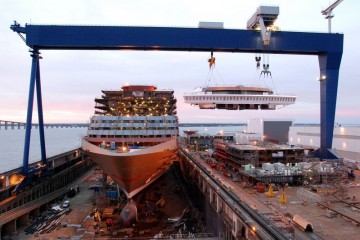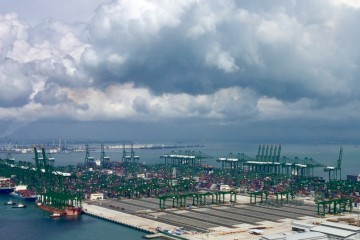This is the story of a small island state. Think pristine beaches, massive unemployment and very high thyroid cancer rates. A country you might have never heard of were it not for its ship registry, one of the largest in the world. An international registry that is successful and well-respected, yet all but acts as an engine for local development.
Our story is part of a larger geopolitical story. The registry is closely linked to an agreement with the US, under which the US guarantees military cover for the island state and in exchange has the right to operate armed forces in the area and – in times of war – to confiscate the ships registered in the island state. The ship registry is an American company, owned and managed by Americans. So, it is a story where US geopolitics meets US corporate interest. Many of the ships registered in the island state are owned by Americans; they pay no taxes, have no administrative burdens and are protected by the US Army.
A win-win situation? Well, yes, if you want to be up-beat. The registry provides annual income to the island that it otherwise probably would not have had. We are talking about 5 million US dollars per year, not a marginal share of the state budget of the island.
Yet, pretty marginal if you compare it to the thousands of ships that are registered in the island state. In particular if you realise that the ship registry has acted as a vehicle to sell additional “corporate services”, including shell companies, usually associated with tax avoidance and evasion. According to some observers, this corporate registry counts around 40,000 companies. This must be lucrative business, if the extensive global office network in more than twenty countries and 400+ global staff of the private registry is any indication.
So, a flourishing private enterprise, but it does not actually create any local jobs. What’s more, practically none of seafarers of the ships flagged in the island state comes from the island state. The private registry does not seem to have developed local capacity, nor created maritime schools or institutes that could have changed this peculiar situation. In other words, the local development impact of the private registry is quasi zero.
One should add that the private registry is not actually located in the small island state: its office is in the US, close to the political powers in DC that have facilitated the favourable arrangements. The physical records are also located in the US, explicitly prescribed by the Maritime Act of the island state. So here we have one of the world’s largest flag states that does not even have access to the records of its registry. This means: it cannot possibly supervise the registry and fulfil its duties as a flag state. A situation that is not without risk, as the flag state could be held liable for lacking oversight and control. Needless to say, the island state has never been able to audit the books of the registry, despite various requests.
In addition, the small island state is stripped of its strategic decision-making powers. The private registry advises on the appointment of the country’s maritime administrator that represents the island at the IMO. But in practice, it is the registry that has the strongest cards, as it pays all costs related to IMO membership and delegation. Although the Parliament requires that diplomatic posts are held by passport holders, practice is different. Participation of local officials and sometimes even locally elected politicians in IMO meetings seems to require the approval of the private registry. The island state has difficulties in holding the registry representatives accountable for their interventions in IMO meetings. All of this is not without significance as the small island state suffers from severe climate change impacts that would not necessarily enter into the calculus of a private shipping registry.
Global trade is impossible without shipping – and shipping has become a whole lot cheaper thanks to open ship registries like the one of our small island state. Is it not ironic that these states, these facilitators of global trade hardly see the spoils of it?



